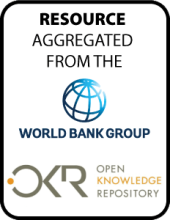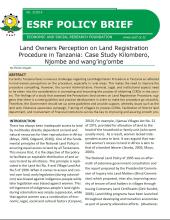Land Library Search
Through our robust search engine, you can search for any item of the over 73,000 highly curated resources in the Land Library.
If you would like to find an overview of what is possible, feel free to peruse the Search Guide.
/ library resources
Showing items 1 through 9 of 39.This report summarizes a case study of the Mexican ejidocommunity tenure system. Mexico was selected for this case study because of the rich history and extensive scale of the country’s community land tenure and registration systems.
Over the last decade, the Government of Rwanda (GoR) has introduced several land reforms through formulation and enactment of enabling legal framework, establishment of land administration institutions and implementation of national land tenure regularization.
Despite the general consensus on the need for land reforms to boost agricultural development, the lack of blueprint on required actions to safeguard land rights forces many countries to pilot various policy measures with mixed results.
La presente Ley de Armonización y Simplificación en materia de Protección del Territorio y de los Recursos Naturales, tiene como finalidad incidir sobre la arquitectura del sistema territorial y medioambiental con el fin de eliminar rigideces innecesarias y clarificar las competencias que corresp
The Latin America and Caribbean region
has had impressive achievements in the past decade, such as
cutting extreme poverty by half and adding more than 50
million people to the middle class. Beyond the positive
In 1984, the Land Tenure Center embarked on a project to evaluate the experiences with land registration and tenure reform in Africa.
This Law amends and supplements articles 17 and 18 of Law No. 9948 of 2008 dealing with the already-started land distribution procedures regulated by previous Laws No. 7501 of 1991 and No. 8312 of 1998 and provides local government structures with more time to finalize the documentation.
Currently Tanzania faces numerous challenges regarding Land Registration Procedure in Tanzania as reflected in land owners perceptions on the procedure, especially in rural areas. This makes the need to improve the procedure compelling.
Includes views of land registration in Omahalya Village in the Omusati Region of Namibia, connection to the land, value of registration, protection from land grabbing and conflicts, investing in their land, women’s empowerment, the commonage.







